
Negotiation and settlement negotiations are essential skills in the arsenal of any attorney, wielding the power to secure favorable outcomes for clients while mitigating the burdens of prolonged legal battles. However, mastering the art of negotiation requires finesse, strategy, and a keen understanding of human dynamics. Here, we offer a comprehensive guide for attorneys seeking to navigate the intricacies of negotiation and achieve optimal results for their clients.
Preparation serves as the cornerstone of successful negotiation. Before entering negotiations, attorneys must meticulously analyze the strengths and weaknesses of their case, identify their client’s objectives, and anticipate potential concessions and counterarguments. “Knowing your BATNA (Best Alternative to a Negotiated Agreement) is crucial,” advises Sarah Thompson, a seasoned negotiator. “It provides leverage and clarity amidst the uncertainties of negotiation.”
Effective communication lies at the heart of successful negotiation. Attorneys must articulate their client’s interests and objectives persuasively while actively listening to the opposing party’s concerns. “Empathy is key,” remarks John Smith, a renowned mediator. “Understanding the motivations and priorities of the other side enables attorneys to craft solutions that satisfy both parties’ interests.”
Building rapport and establishing trust are essential components of productive negotiation. “A collaborative approach fosters goodwill and paves the way for mutually beneficial agreements,” explains Thompson. By fostering an atmosphere of respect and cooperation, attorneys can overcome adversarial dynamics and facilitate constructive dialogue.
Strategic concessions play a crucial role in negotiation, enabling attorneys to build momentum and foster goodwill. However, concessions must be calculated and strategic, ensuring that they align with the client’s objectives and do not compromise their position. “Every concession should be met with a reciprocal concession,” advises Smith. “This creates a sense of fairness and reciprocity that fosters progress.”
Embracing creativity and flexibility is essential in overcoming impasses and reaching innovative solutions. “Thinking outside the box allows attorneys to uncover hidden opportunities and break through stalemates,” remarks Thompson. By exploring alternative options and reframing issues, attorneys can unlock new avenues for resolution.
Maintaining composure and managing emotions are essential skills in the heat of negotiation. “Emotional intelligence is just as important as legal acumen,” asserts Smith. “Attorneys must remain calm, composed, and adaptable, even in the face of adversity.”
Documentation and follow-through are critical components of successful negotiation. Attorneys must ensure that agreements are clearly documented, outlining the terms and obligations of all parties involved. Additionally, diligent follow-up ensures that negotiated agreements are implemented effectively and that both parties uphold their commitments.
In conclusion, negotiation and settlement negotiation are indispensable tools in the attorney’s toolkit, offering a pathway to efficient, cost-effective resolution while safeguarding the interests of clients. By embracing preparation, communication, collaboration, and creativity, attorneys can navigate the complexities of negotiation with confidence and skill, achieving optimal outcomes for their clients while upholding the principles of justice and fairness.

Leave a Reply